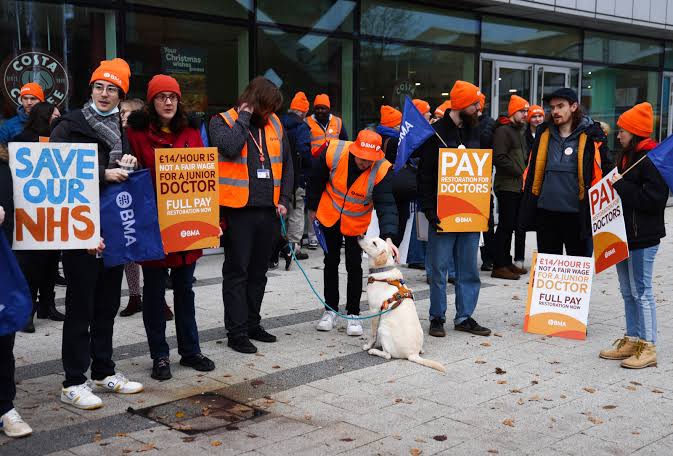Unprecedented six-day strike by NHS doctors in England admits long-running pay dispute

Junior doctors in England initiated a six-day consecutive strike on Wednesday, marking the longest walkout in the seven-decade history of Britain’s National Health Service (NHS). The industrial action, occurring during a peak period for the NHS, amplifies the ongoing dispute between these doctors and the UK government over pay concerns.
The strike, following a three-day action just before Christmas, is part of a broader wave of stoppages across various sectors, driven by soaring inflation and a cost-of-living crisis. Doctors on the picket lines, notably outside St Thomas’ Hospital in London, displayed signs advocating for increased funding for the overstretched health service and protesting against reduced wages, emphasizing that their real-term earnings have diminished by a quarter under the current government.
Highlighting the global impact, some signs on the picket lines drew attention to the exodus of doctors to countries like Australia, citing not only better pay but also improved work-life balance. Medics argue that other nations recognize the inadequacy of doctor salaries and offer more attractive packages, fueling the departure of UK-based medical professionals.
UK Health Secretary Victoria Atkins expressed concern over the serious impact of the strikes on patients nationwide. Over 1.2 million appointments have been rescheduled, with more than 88,000 affected last month alone. Atkins urged the British Medical Association (BMA) Junior Doctors Committee to end the strikes and return to negotiations for a fair resolution.
Junior doctors, striking for the seventh time since March, rejected the government’s offer of a 3.0-percent rise on top of an earlier 8.8-percent increase, citing uneven distribution across different grades and foreseeing pay cuts after inflation. The BMA accused the government of failing to engage in new talks, asserting that strike action remains the only way to garner attention.
The NHS anticipates a significant impact on routine care, with up to half of the medical workforce participating in picket lines. Concerns arise over the potential strain on services, particularly amidst the post-Christmas period when hospitals traditionally experience a surge in patient numbers. While emergency and urgent care services will continue, the strike’s broader repercussions on planned operations and appointments are expected to be profound, exacerbating existing challenges in waiting times and healthcare backlogs.












